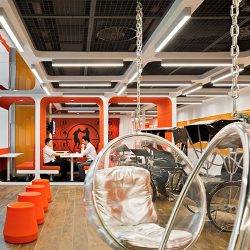April 25, 2019
Space Matrix becomes the strategic Asia Pacific partner for The United Workplace
 Space Matrix, a major design and build workplace consultancy in Asia Pacific has joined The United Workplace (TUW), a global network of workplace consultancies and designers. The United Workplace’s existing partners include Fourfront Group in Europe, Amicus in Australia and New Zealand, Summertown in the Middle East, Ware Malcomb in the USA and Contract Workplaces in South America. Founded in 2001, Space Matrix is a dynamic, agile digital enterprise specialising in workplace design. The company operates from 14 office locations in Australia, China, Hong Kong, India, the Philippines, Thailand, Singapore (HQ) and New York. The firm has completed work across 55 cities, employs over 400 professionals globally and continues to push the boundaries in workplace transformation. (more…)
Space Matrix, a major design and build workplace consultancy in Asia Pacific has joined The United Workplace (TUW), a global network of workplace consultancies and designers. The United Workplace’s existing partners include Fourfront Group in Europe, Amicus in Australia and New Zealand, Summertown in the Middle East, Ware Malcomb in the USA and Contract Workplaces in South America. Founded in 2001, Space Matrix is a dynamic, agile digital enterprise specialising in workplace design. The company operates from 14 office locations in Australia, China, Hong Kong, India, the Philippines, Thailand, Singapore (HQ) and New York. The firm has completed work across 55 cities, employs over 400 professionals globally and continues to push the boundaries in workplace transformation. (more…)










 Job security is the top reason employees in the UK joined their company, and also the main reason they stay, according to Mercer’s
Job security is the top reason employees in the UK joined their company, and also the main reason they stay, according to Mercer’s 





















March 6, 2019
Beware the great apex fallacy of workplace design 0
by Mark Eltringham • Comment, Flexible working, Furniture, Technology, Workplace design